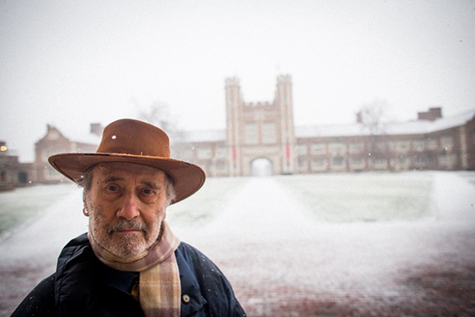
Ernst K. Zinner, PhD, research professor emeritus of physics and earth and planetary sciences in Arts & Sciences at Washington University in St. Louis, died Thursday, July 30, of complications of the mantle cell lymphoma he had battled for more than 19 years. He was 78.
Zinner had been a member of the university community for 50 years. He earned his PhD at Washington University in 1972 in high-energy particle physics, the last person at the university to graduate with a degree in experimental particle physics. The same year, fellow physicist Robert M. Walker invited him to work for the newly established Laboratory for Space Physics (later part of the McDonnell Center for the Space Sciences) as a research associate. In 1989 he was named a research professor in physics and earth and planetary sciences, a position he held until assuming emeritus status earlier this year.
Among many other accomplishments, in 1987 Zinner identified for the first time material in the laboratory that predated the formation of the solar system 4.6 billion years ago. By analyzing grains they boiled out of primitive meteorites, Zinner and his team proved they were minute amounts of stardust — diamond and silicon carbide — that originated outside our solar system.
This work involved a measurement technique called secondary-ion mass spectrometry (SIMS), conducted with an instrument called an ion probe. Zinner dedicated more than a decade to getting reliable results with SIMS and became one of the leading authorities on the instrument, training scientists worldwide in its use.
In 2007, to honor Zinner’s “stellar” career completing 70 “orbits,” his colleagues organized a symposium entitled “SIMS in the Space Sciences: The Zinner Impact,” at Washington University. More than 100 scientists from all over the globe attended, and the talks were later published in a special issue of the journal Meteoritics & Planetary Science that was dedicated to Zinner.
In 1997, Zinner received the J. Lawrence Smith Medal of the National Academy of Sciences, the top award in this field from that body, and the Leonard Medal from the Meteoritical Society, an international scientific group. He became a fellow of the Meteoritical Society in 1988, a fellow of the American Physical Society in 1990, and a fellow of the American Association for the Advancement of Science in 2011.
“Zinner’s leading characteristic, beside his scientific prowess, was his generosity,” Larry Nittler, who was a graduate student in Zinner’s lab in the 1990s and is now a staff scientist at the Carnegie Institution in Washington D.C. “He was very generous with everyone he worked with but especially with young people, with graduate students and postdocs.
“His role in mentoring lots and lots of people cannot be overstated,” Nittler said. “In addition to the many graduate students and postdocs that came through the lab, he hosted legions of visitors from all over the world, both students and senior scientists. He would open up his lab to them and he and his wife would open up their home. If you came to work with Ernst, you knew you would be staying with the Zinners and they would be feeding you breakfast. “
Born in St. Peter in der Au, Austria, a small medieval town about 100 miles west of Vienna, Zinner obtained an undergraduate degree in physics from the Technical University in Vienna, moving to the United States in the mid-1960s to attend Washington University.
In 1980, on sabbatical in Vienna, he met Brigitte Wopenka, a young faculty member at the Institute for Analytical Chemistry, and brought her to St. Louis where they were married. For the next 30 years, she worked as a senior research scientist in earth and planetary sciences at Washington University, developing an international reputation in the field of micro-Raman spectroscopy.
A passionate lover of classical music, Zinner was an accomplished pianist. For many years he met weekly with his friends to play the harpsichord in a baroque music ensemble. At the age of 55, he took up the cello so that he could play it with his son, Max, who was then learning it himself as a four-year-old.
Ernst is survived by his wife and his son, Max Giacobini Zinner, who lives in New York City, as well as by many relatives in Austria, including all four of his younger siblings.
There will be an open house in his honor at the Saint Louis Art Museum Sunday, Aug. 16, from 6-10 p.m.
Zinner’s family will create an endowed “Ernst Zinner Memorial Cello Scholarship Fund” dedicated to advanced cello students at the Community Music School at Webster University in St. Louis. Donations can be made at: www.crowdrise.com/ErnstZinner